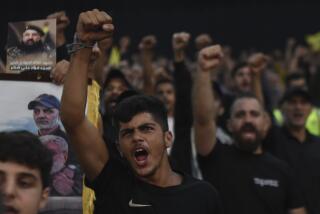Assassination as a Policy
- Share via
The strained attempt by Brian Jenkins (Opinion, Nov. 16, “Assassination: Should We Stay the Good Guys?”) to convince us that terrorists should not be assassinated is such a puzzling jumble of semantic legerdemain, unsupported assertions, contradictions, irrelevancies, and flag-waving that one hardly knows where to begin. So I’ll keep it simple and brief.
The primary reason Jenkins gets himself and the reader so ensnarled is his critical failure to make a distinction between assassination heads of state (like Moammar Kadafi or the Ayatollah Khomeini), leaders of terrorist organizations (like Abu Nidal), and hit men (like the nasty thugs who plant bombs on civilian airplanes or gun down people in air terminals and synagogues and Olympic dormitories, etc.)
Then, after columns of limp hand-wringing over the immorality and illegality and ineffectuality of assassination, Jenkins makes the curious admission that he deems “aggressive covert operations” against terrorist groups acceptable because the resultant random deaths would not violate his definition of assassination: “the cold-blooded selection and murder of a specific individual.” In other words, killing terrorists can be justified only so long as it’s collective and non-discriminatory--and hot blooded. Most curious.
Finally, Jenkins concedes that even the “cold-blooded” variety of retaliation against terrorists would be acceptable if we were “at war.” Jenkins may be living in a well insulated cocoon, but the rest of us who glance at the newspapers occasionally have been all too aware that the lunatic fringe of Islam has declared war--both by word and deed--on the West in general and the United States specifically.
What option is left? Jenkins himself concedes that “assassination is the cleanest form of warfare.” Let’s get on with it.
C.J. WRIGHT
Venice


